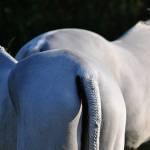Equine Obesity: Gluttony or Genetics?

As obesity in horses continues to rise, so does the prevalence of obesity-related health conditions, specifically insulin dysregulation, laminitis, and osteoarthritis. These conditions often result in premature mortality.
“Many factors contribute to equine obesity: the perception by owners that ‘plump’ is normal or desired; diminished amounts of physical activity; unnecessary feeds and treats that owners think horses should have; or ignorance regarding the negative effects of excess body weight,” explained Kathleen Crandell, Ph.D., a nutritionist for Kentucky Equine Research.
Many horses thrive calorically on forage-only diets. “A forage-based diet may not, however, be fully balanced. To provide nutrients that may be low or missing in the forage portion of the diet, a vitamin and mineral supplement can do the job with minimal caloric impact,” Crandell advised. Other high-quality supplements can be also added to the diet to target specific health challenges.
While it is true that obesity occurs as a consequence of energy intake chronically exceeding energy output, research shows that genetics also plays a role in body weight.*
“In a recently published comprehensive review on the role of genetics on obesity, researchers indicated there is no doubt that obesity is highly heritable,” Crandell shared.
The fact that horses of certain breeds or types, such as ponies or cobs, are at risk of obesity lends evidence to the genetic basis of body condition.
In humans, some forms of obesity are related to specific genetic defects, though these occur rarely. Instead, “obesity is a complex trait, caused by the additive effect of hundreds, possibly even thousands, of common genetic variants,” according to the authors of the review.
Some researchers have searched for genes related to obesity and metabolic abnormalities but with little success. Regardless of species, researchers still have limited data as to which genes are responsible for weight gain or how those genes exert their effects.
Further research into the genetic basis of obesity is important as it will improve patient care and foster understanding of fat deposits in horse health.
Does your horse need to lose weight but unsure where to start? These articles offer a jump-start:
- Horse Weight Loss Requires Diet Changes, Exercise
- Weight Loss in Horses: Add Exercise to the Equation
- Horse Weight Loss: Try These Six Steps
*Wallis, N., and E. Raffan. 2020. The genetic basis of obesity and related metabolic diseases in humans and companion animals. Genes (Basel) 11(11):1378.








